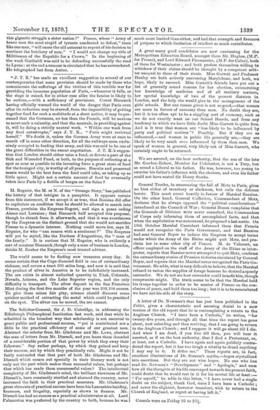The Solicitor-General, Sir J. D. Coleridge, in addressing the Edinburgh
Philosophical Institution last week, said that while he admitted in the broadest way that scholarship is not essential to great public and professional success, "yet it contributed not a little to the practical efficiency of some of our greatest men. Abstract the scholar from Mr. Gladstone and Mr. Lowe, abstract the man of letters from Mr. Disraeli, and you leave them denuded -of a considerable portion of that power by which they sway their 'followers." Say rather perhaps, by which they gained and keep -their success, not by which they practically rule. Might it not be -fairly contended that that part of both Mr. Gladstone and Mr. Disraeli which comes out specially in their literary work is not .only not the part which makes them successful rulers, but perhaps that which has made them unsuccessful rulers ? The intellectual -complexity of Mr. Gladstone's mind, the brilliant viewiness of Mr. DisraelPs, have constantly startled and alarmed the country, never increased the faith in their practical measures. Mr. Gladstone's great elements of practical success have been his Lancashire lucidity, keenness, and frugality, especially as shown in finance. Mr. Disraeli has had no success as a practical administrator at all. Lord Palmerston was preferred by the country to both, because he was
much more limited than either, and had that strength and firmness of purpose to which limitation of intellect so much contributes..


































 Previous page
Previous page